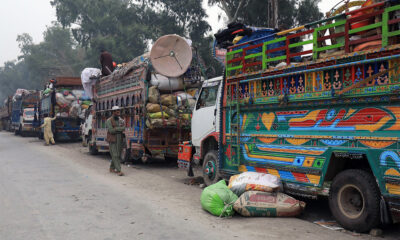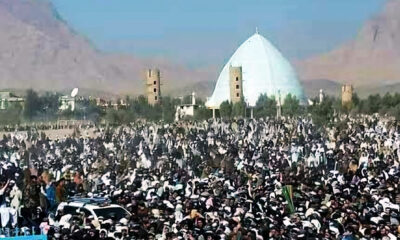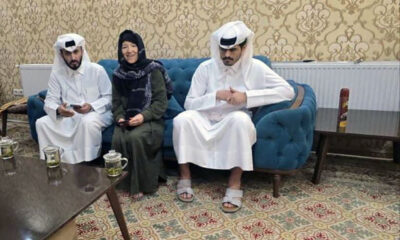Latest News
Australian soldier drinks beer from dead Taliban fighter’s prosthetic leg

A photograph obtained by The Guardian shows a senior Australian special forces soldier drinking beer out of the prosthetic leg of a dead Taliban fighter at an unauthorised bar on a base in Uruzgan province, in Afghanistan, in 2009.
The picture of the beer swilling soldier comes amid a growing scandal following the release of a report recently that Australia’s special forces were allegedly responsible for the unlawful death of 39 Afghans.
A number of photographs obtained by the Guardian show the senior soldier drinking from the leg in an unofficial bar known as the Fat Lady’s Arms, which was set up inside Australia’s special forces base in Tarin Kowt, the capital of Uruzgan province, in 2009, The Guardian reported.
Another photo appears to show two soldiers performing a dance with the leg.
The photograph is the first to be published that confirms previous reports of the practice of using the leg as a drinking vessel, The Guardian reported.
According to the report, some soldiers have said the practice was widely tolerated by officers at high levels and even involved some of them – despite the limb potentially being a war trophy, which Australians soldiers were forbidden from taking from the battlefield.
The Guardian said the leg is believed to have belonged to a suspected Taliban fighter killed during a special forces raid on two compounds and a tunnel complex in Uruzgan in April 2009.
The news outlet stated that the leg was eventually mounted on a wooden plaque under the heading Das Boot, alongside an Iron Cross – a military decoration used in Nazi Germany. The leg travelled with the squadron at all times, one former trooper told the Guardian.
“Wherever the Fat Lady’s Arms was set up, then that’s where the leg was kept and used occasionally for drinking out of,” he said.
The soldier also said that senior commanders would occasionally visit the bar and would have seen the leg and potentially the practice of drinking from it.
The Guardian reported that rumours that pictures exist of high-ranking officers drinking from the leg have long been circulating in the Australian special forces community and Australian media have also reported about the leg’s existence.
The Guardian stated meanwhile that the war crimes report, released recently, did not mention whether any soldiers were under investigation for taking trophies but did mention the Fat Lady’s Arms as being an example of how ethical leadership was compromised.
The report said of the unauthorised bar that this involved “the toleration, acceptance and participation in a widespread disregard for behavioural norms: such as drinking on operations, the Fat Lady’s Arms, and lax standards of dress, personal hygiene and behaviour – and not only on operations – which would not have been tolerated elsewhere in Army”.
Latest News
Pakistan finalizes plans to detain and deport Afghans as deadline nears
Pakistan has granted Afghan migrants, both undocumented and those holding ACC cards, a deadline of March 31 to voluntarily leave the country.
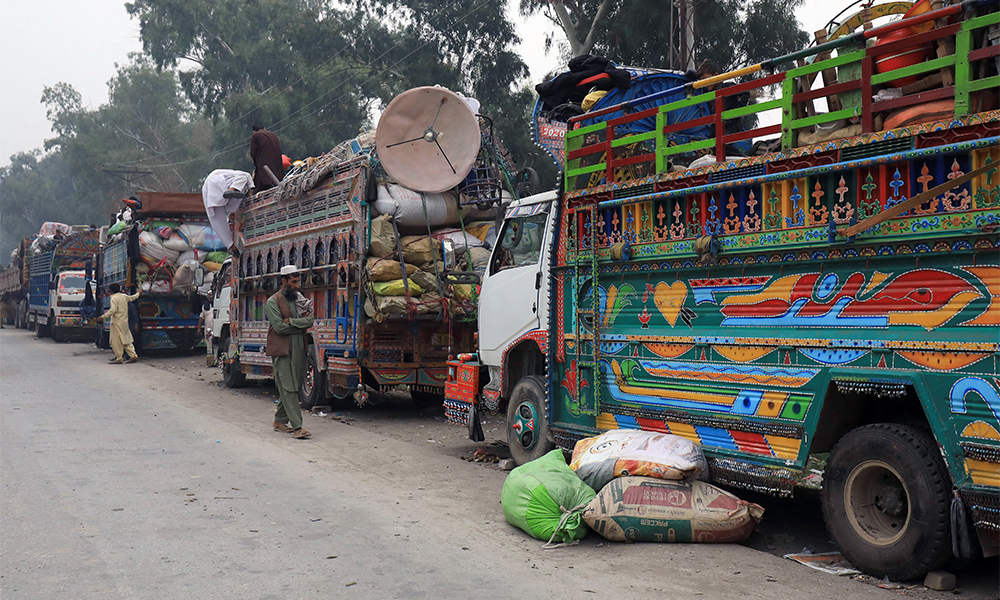
Officials in Pakistan have completed arrangements to detain and expel Afghan citizens following the March 31 deadline for their voluntary return to Afghanistan. This move is part of the country’s plan to address the growing concerns regarding the status of Afghan migrants in Pakistan.
A high-level meeting on Friday, chaired by Interior Minister Mohsin Naqvi, reviewed the measures to repatriate Afghan Citizen Card (ACC) holders. This meeting focused on ensuring the effective execution of the government’s deadline and the logistics surrounding the return process.
Despite requests from the Afghan government and human rights organizations, Pakistani authorities have firmly rejected extending the deadline for the return of ACC holders. The Pakistani government had initially set the deadline for the end of March, and the expulsion process will move forward as planned.
Mohsin Naqvi also revealed that Talal Chaudhry, the State Minister for Interior, would travel to the provinces to assess and address any challenges and potential issues in the process of Afghan migrants’ return.
Meanwhile, Pakistani security forces have detained at least 932 Afghan migrants in Rawalpindi, as the deadline for the expulsion of Afghan migrants with ACC cards approaches.
Human rights organizations have strongly condemned Pakistan’s recent decision to expel Afghan refugees, labeling it a violation of international law and a potential humanitarian crisis. They argue that many of these refugees, including human rights defenders, political activists, and victims of gender-based violence, fled Afghanistan to escape persecution and are now at risk of facing harm if deported.
The Human Rights Commission of Pakistan (HRCP) has expressed deep concern over the government’s ultimatum for undocumented immigrants to leave by March 31, warning that this could lead to a humanitarian disaster. They highlight that such forced repatriation violates international customary law and could adversely affect vulnerable groups, including women, children, the elderly, and individuals with disabilities.
Amnesty International has called on Pakistan to halt the detentions, deportations, and harassment of Afghan refugees, emphasizing that these actions violate the principle of non-refoulement, which prohibits returning individuals to places where they face risks of persecution. They stress that deporting Afghan refugees, especially women and girls, could deny them access to safety, education, and livelihoods.
Pakistan has granted Afghan migrants, both undocumented and those holding ACC cards, a deadline of March 31 to voluntarily leave the country.
However, Pakistani officials confirmed that Afghan migrants holding “PoR” cards are not at risk of being expelled until June 30.
Meanwhile, the International Organization for Migration (IOM) reported a sharp decline in Afghan returns and deportations during the first half of March. Between March 1 and 15, returns dropped by 67 per cent, while deportations fell by 50 per cent compared to the previous reporting period (February 16-28).
Latest News
Eid prayer led by IEA leader in Kandahar: Mujahid
Abdul Salam Hanafi, the Deputy Prime Minister for Administrative Affairs, called on opposition groups to return to Afghanistan and participate in the country’s reconstruction.
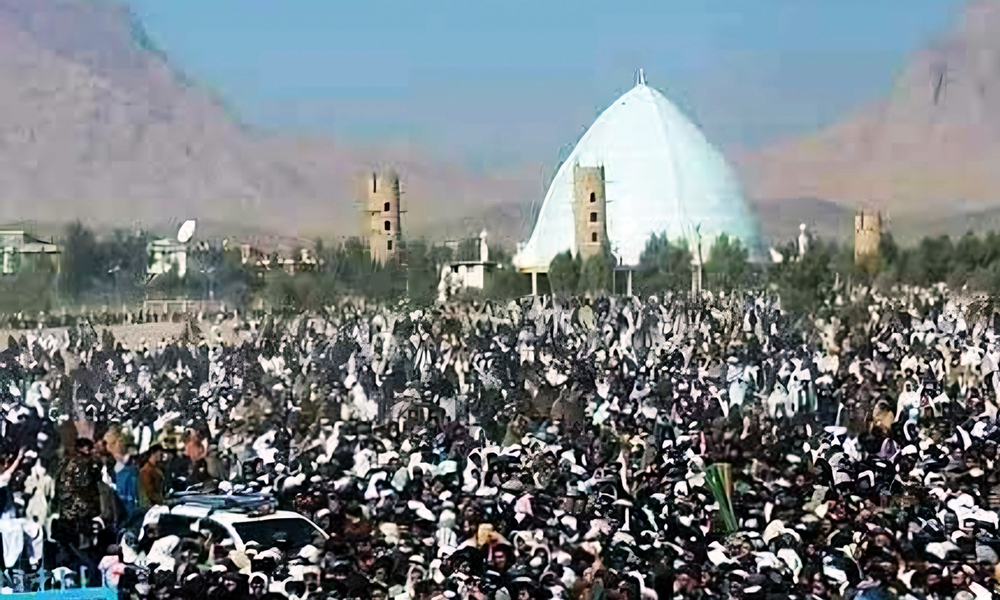
Zabihullah Mujahid, the spokesperson for the Islamic Emirate, announced on Sunday that the Eid al-Fitr prayer was held at the Eidgah Mosque in Kandahar, where Hibatullah Akhundzada, the Supreme Leader of the IEA, led the prayers.
Thousands of people attended the event, marking a significant religious occasion.
Other IEA senior officials gathered for the Eid prayer at the ARG (Presidential Palace) in Kabul.
Mullah Abdul Ghani Baradar, the Deputy Prime Minister for Economic Affairs, took the opportunity to address the public, stating that the Islamic Emirate is ready to engage with the world based on mutual respect. He also emphasized the importance of unity and solidarity among the Afghan people.
Baradar stressed that rebuilding the country requires internal unity and that no foreign entity can achieve this task for Afghanistan. On security, he highlighted the achievements of the past three years, asserting that under their administration, Afghanistan has become fully secure.
He reaffirmed that the IEA is committed to fostering international relations through an “economy-driven policy.”
Abdul Salam Hanafi, the Deputy Prime Minister for Administrative Affairs, called on opposition groups to return to Afghanistan and participate in the country’s reconstruction.
Hanafi reiterated the IEA’s desire for economy-driven relations with all regional and global powers based on mutual respect.
Mohammad Yousuf Wafa, the Governor of Balkh, also affirmed that the current system will not be undermined. He stated, “This system was established through great sacrifices, and it is our collective duty to defend it.”
The Eid prayers and the speeches of the IEA leadership underscored a message of unity, security, and a desire for positive international engagement.
Latest News
US citizen detained in Afghanistan has been freed
A source said earlier that Hall was freed on Thursday following a court order and with logistical support from Qatar in its role as the United States’ protecting power in Afghanistan.
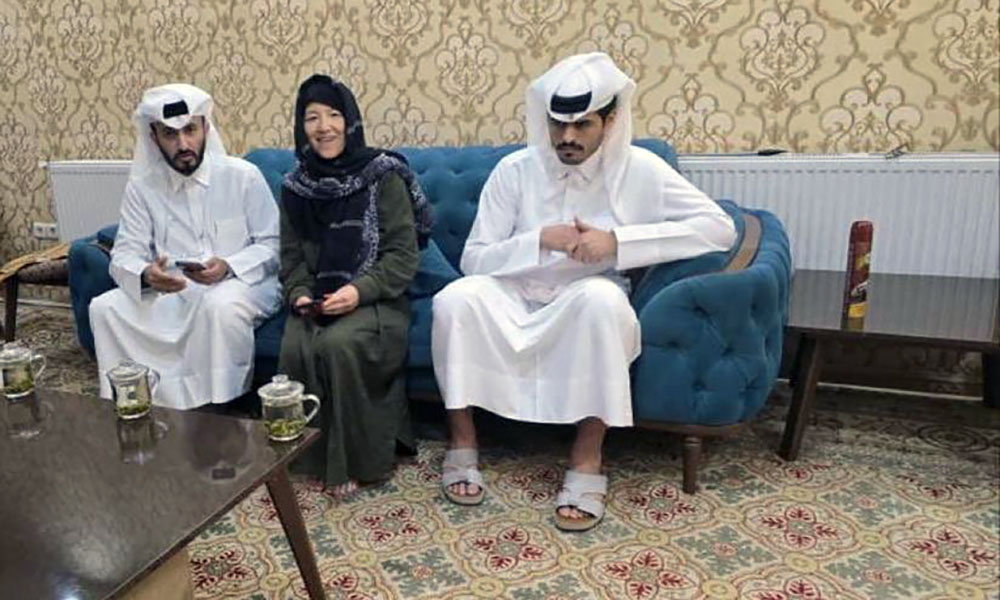
American citizen Faye Hall said on Saturday she had been released by the Islamic Emirate of Afghanistan (IEA) after being detained in Afghanistan last month, Reuters reported.
“I’ve never been so proud to be an American citizen,” Hall said in a video posted by President Donald Trump on Truth Social. “Thank you, Mr President,” she added. “God bless you.”
Hall’s release was announced earlier by former U.S. Special Representative to Afghanistan Zalmay Khalilzad on X.
A U.S. official said Adam Boehler, the special presidential envoy for hostage affairs, along with Qatari officials and others, negotiated her release. Hall was arrested in February with a British couple, Barbie and Peter Reynolds, read the report.
British media reported that the couple, in their seventies, had been running projects in schools in Afghanistan for 18 years, deciding to stay even after the IEA returned to power in 2021.
There was no mention of the couple, whose family has pleaded for their release amid concerns over their health.
A source said earlier that Hall was freed on Thursday following a court order and with logistical support from Qatar in its role as the United States’ protecting power in Afghanistan.
Hall was received at the Qatari embassy in Kabul and confirmed to be in good health after undergoing medical checks, the source said.
Several Americans are still detained in Afghanistan, Reuters reported.
-

 World4 days ago
World4 days agoSecretive Chinese network tries to lure fired US federal workers, research shows
-
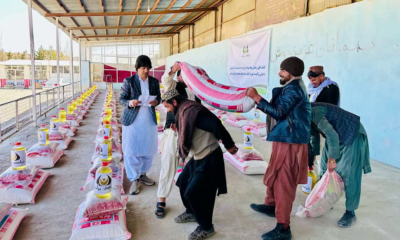
 Latest News5 days ago
Latest News5 days agoDozens of needy families in Ghazni get much needed food aid from Bayat Foundation
-

 Latest News4 days ago
Latest News4 days agoAfghanistan has the right to access Amu River’s water: Uzbek minister
-

 Sport5 days ago
Sport5 days agoAFC Asian Cup 2027 Qualifiers: Myanmar defeat Afghanistan 2-1
-

 Latest News3 days ago
Latest News3 days agoAmnesty international urges Pakistan to halt Afghan deportations
-

 Climate Change4 days ago
Climate Change4 days agoUN and ICRC warn of serious water shortage in Afghanistan
-

 International Sports4 days ago
International Sports4 days agoIPL 2025: Punjab Kings secure thrilling 11-run win over Gujurat Titans
-

 Latest News3 days ago
Latest News3 days agoAfghanistan-Iran-Europe railway corridor activated


